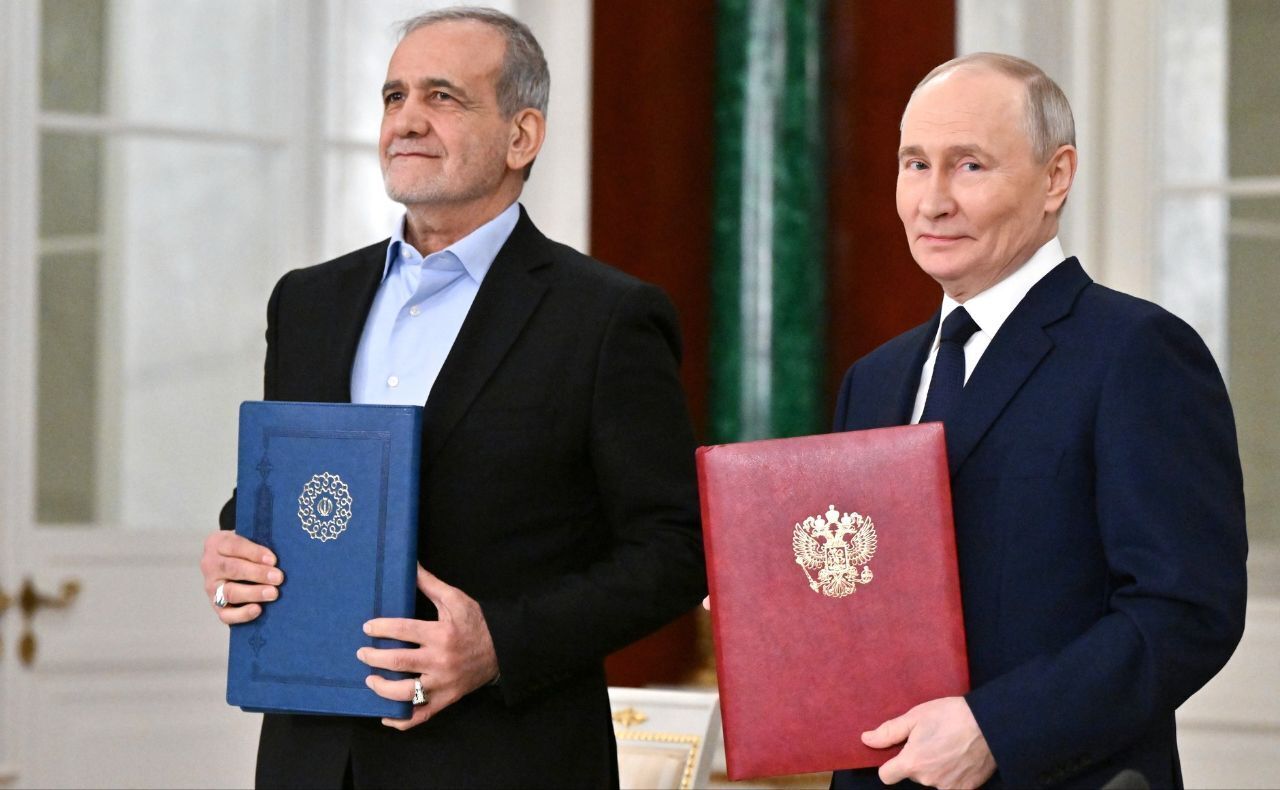Shazia Anwer Cheema
Under strict Western sanctions, Russia and Iran this week inked a 20-year strategic agreement that includes military, nuclear energy, advanced technology, and financial cooperation. They are members of SCO and BRICS. They are under US and EU sanctions. They are considered enemies of the West. Both are challenging the West, and they are also joined by China in this move.
They called the 47-point agreement a ‘Treaty’ signed on January 17, 2025, in a ceremony in the Kremlin by the presidents of the two countries, Masoud Pezeshkian and Vladimir Putin. These 47 articles have further two to four pointers so the total number of pointers is over 110. Article five has expended their military cooperation, covering a wide range of issues, including the exchange of military and expert delegations, port calls by military ships and vessels, training of military personnel, exchange of cadets and instructors, joint maritime relief and rescue operations as well as combating piracy and armed robbery at sea, countering common military and security threats of a bilateral and regional nature.

Different articles such as Article Six deal with military cooperation but there is no need to further explain because one can understand that port calls by military ships and vessels are a new dimension in their relations that would ensure Russian presence in the Indo-Pacific and Russian fleets can anchor at any of Iranian ports and at any time of their choice. On the other hand, Pakistan’s strategic partnership with China allows joint naval exercises and the presence of Chinese naval ships at Gwadar Port; which neighbors Iranian ports. The critical part of the Indo-Pacific that neighbors the Middle East and Africa is now will have a Russian as well as Chinese presence whenever it is needed by geopolitical developments. It may be remembered that in 2021, Iran and China entered into a 25-year strategic partnership with a commitment to pouring over 400 billion USD (as reported by Western media) into Iranian infrastructure. This development was critical for the Western world but not as critical as it is with Russia for several reasons including the Ukraine war. Iran has taken a risk by going into Iran-Russian deepen relations at a juncture of time when Iran needs the support of the Western world for ongoing Iran-Europe negotiations aimed at resolving the nuclear dispute. It looks like Tehran has lost hope for ‘reasonable’ negotiations with Europe so decided to engage with Russia which is ‘enemy number one’ of Europe due to the Ukraine conflict. There is a possibility that Iran has decided to live without a contract with Europe on nuclear issues although it realizes that Russia cannot stand with it in case of any foreign aggression and even then it is risking its ‘left-over’ relations with Europe. It may be remembered that there is no mutual defence clause in this ‘Treaty’ while Russia signed a formal military alliance to protect North Korea in case of any foreign aggression.
European experts believe that this Treaty is just a yellow signal to the Western world that Moscow and Tehran have taken steps to elevate their relationship toward a sort of strategic partnership, particularly in areas like military and security cooperation and they can go further (even to nuclear sharing for civil purposes) in case west will continue to put sanctions on them.
Over the last three years, Russia has faced an existential challenge from the West and the situation is also quite desperate for Iran which has virtually lost Axes of Resistance in the Middle East, and its proxies have been well targeted in the last year. Both countries are in desperate need of security alliances and deepened cooperation but the Iran-Russia relationship is not without its challenges. Economic difficulties caused by sanctions and differences in long-term geopolitical agendas have created barriers to the full potential of this partnership. In the past, Russia backed United Nations sanctions against Iran and delayed delivering the S-300 missile defence system to Iran until Putin completed the deal in 2015. This historical background provides sufficient reasons why Russia and Iran are cautious of just how successful such a partnership would be for both nations. However, there is no doubt that the enhancing partnerships among China-Iran and Russia-Iran are likely to strengthen a multipolarity rather multi-nodal world and all three are countering the expansionist plans of the United States and the collective West. Nevertheless, all three (Russia-China-Iran) do not have any military alliance or defence deal to protect each other collectively (as EU and NATO have) so their collaboration in the field of security and defence does not challenge the Western world that has all the tools to collectively attack any country of its choice.
Challenging the hegemony of the collective West is also on the agenda of BRICS and SCO but I strongly believe that nobody can practically challenge the Western hegemony unless it is backed by a military alliance such as the West has.
After World War II, the Cold War resulted in the formation of two opposing military alliances, i.e., the North Atlantic Treaty Organisation (NATO) and the Warsaw Pact. The end of the Cold War saw the end of the Warsaw Pact. NATO not only continues to exist but is expanding beyond its original scope. China remains on the opposite side of the military alliances’ spectrum. It does not maintain any formal military alliances and isn’t part of any. Russia and China are gradually growing closer due to common interests, but both have avoided entering into a military alliance. China believes that Western hegemony is already challenged in the economic sphere while Russia challenged the West by expanding the tenure of the Ukraine War. Will such strategies stop NATO from attacking any country that is in the sphere of China and Russia in the future, this is a question that still needs an answer.
 Shazia Anwer Cheema is a Prague-based author, analyst, and freelance writer whose articles appear in international media outlets. She did her M.Phil in Cognitive Semiotics from Aarhus University Denmark and is completing her Ph.D. in Semiotics and Philosophy of Communication at Charles University Prague.
Shazia Anwer Cheema is a Prague-based author, analyst, and freelance writer whose articles appear in international media outlets. She did her M.Phil in Cognitive Semiotics from Aarhus University Denmark and is completing her Ph.D. in Semiotics and Philosophy of Communication at Charles University Prague.
Disclaimer:
The views and opinions expressed in this article/Opinion/Comment are those of the author and do not necessarily reflect the official policy or position of the DND Thought Center and Dispatch News Desk (DND). Assumptions made within the analysis are not reflective of the position of the DND Thought Center and Dispatch News Desk News.
